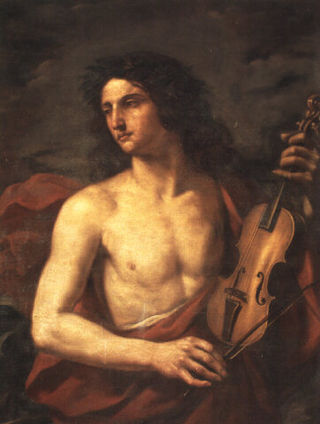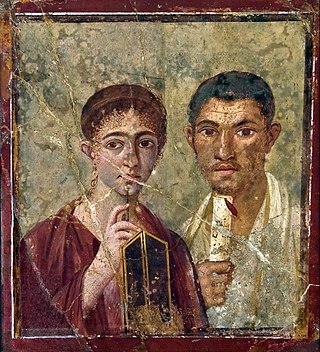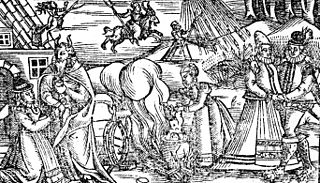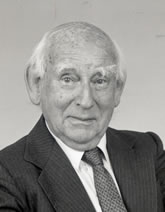Related Research Articles
Historiography is the study of the methods used by historians in developing history as an academic discipline, and by extension, the term historiography is any body of historical work on a particular subject. The historiography of a specific topic covers how historians have studied that topic by using particular sources, techniques of research, and theoretical approaches to the interpretation of documentary sources. Scholars discuss historiography by topic — such as the historiography of the United Kingdom, of WWII, of the pre-Columbian Americas, of early Islam, and of China — and different approaches to the work and the genres of history, such as political history and social history. Beginning in the nineteenth century, the development of academic history produced a great corpus of historiographic literature. The extent to which historians are influenced by their own groups and loyalties — such as to their nation state — remains a debated question.
Cultural bias is the interpretation and judgment of phenomena by the standards of one's own culture. It is sometimes considered a problem central to social and human sciences, such as economics, psychology, anthropology, and sociology. Some practitioners of these fields have attempted to develop methods and theories to compensate for or eliminate cultural bias.

An anachronism is a chronological inconsistency in some arrangement, especially a juxtaposition of people, events, objects, language terms and customs from different time periods. The most common type of anachronism is an object misplaced in time, but it may be a verbal expression, a technology, a philosophical idea, a musical style, a material, a plant or animal, a custom, or anything else associated with a particular period that is placed outside its proper temporal domain.

In the study of history as an academic discipline, a primary source is an artifact, document, diary, manuscript, autobiography, recording, or any other source of information that was created at the time under study. It serves as an original source of information about the topic. Similar definitions can be used in library science and other areas of scholarship, although different fields have somewhat different definitions.

Isobel Gowdie was a Scottish woman who confessed to witchcraft at Auldearn near Nairn during 1662. Scant information is available about her age or life and, although she was probably executed in line with the usual practice, it is uncertain whether this was the case or if she was allowed to return to the obscurity of her former life as a cottar’s wife. Her detailed testimony, apparently achieved without the use of violent torture, provides one of the most comprehensive insights into European witchcraft folklore at the end of the era of witch-hunts.
Whig history is an approach to historiography that presents history as a journey from an oppressive and benighted past to a "glorious present". The present described is generally one with modern forms of liberal democracy and constitutional monarchy: it was originally a term for the metanarratives praising Britain's adoption of constitutional monarchy and the historical development of the Westminster system. The term has also been applied widely in historical disciplines outside of British history to describe "any subjection of history to what is essentially a teleological view of the historical process". When the term is used in contexts other than British history, "whig history" (lowercase) is preferred.
Perspectivism is the epistemological principle that perception of and knowledge of something are always bound to the interpretive perspectives of those observing it. While perspectivism does not regard all perspectives and interpretations as being of equal truth or value, it holds that no one has access to an absolute view of the world cut off from perspective. Instead, all such viewing occurs from some point of view which in turn affects how things are perceived. Rather than attempt to determine truth by correspondence to things outside any perspective, perspectivism thus generally seeks to determine truth by comparing and evaluating perspectives among themselves. Perspectivism may be regarded as an early form of epistemological pluralism, though in some accounts includes treatment of value theory, moral psychology, and realist metaphysics.

Sir Hans Wolfgang Singer was a German-born British development economist best known for the Prebisch-Singer thesis, which states that the terms of trade move against producers of primary products. He is one of the primary figures of heterodox economics.

Historical method is the collection of techniques and guidelines that historians use to research and write histories of the past. Secondary sources, primary sources and material evidence such as that derived from archaeology may all be drawn on, and the historian's skill lies in identifying these sources, evaluating their relative authority, and combining their testimony appropriately in order to construct an accurate and reliable picture of past events and environments.
Source criticism is the process of evaluating an information source, i.e.: a document, a person, a speech, a fingerprint, a photo, an observation, or anything used in order to obtain knowledge. In relation to a given purpose, a given information source may be more or less valid, reliable or relevant. Broadly, "source criticism" is the interdisciplinary study of how information sources are evaluated for given tasks.

Detective Chief Inspector John George Littlechild was the first commander of the London Metropolitan Police Special Irish Branch, renamed Special Branch in 1888.
Arthur John Brereton Marwick was a British social historian, who served for many years as Professor of History at the Open University. His research interests lay primarily in the history of Britain in the twentieth century, and the relationship between war and social change. He is probably best known, however, for his more theoretical book The Nature of History, and its greatly reworked and expanded version The New Nature of History (2001). In the latter work he defended an empirical and source-based approach towards the writing of history, and argued against the turn towards postmodernism. He believed firmly that history was "of central importance to society".

Palgrave Macmillan is a British academic and trade publishing company headquartered in the London Borough of Camden. Its programme includes textbooks, journals, monographs, professional and reference works in print and online. It maintains offices in London, New York, Shanghai, Melbourne, Sydney, Hong Kong, Delhi, and Johannesburg.
Critical historiography approaches the history of art, literature or architecture from a critical theory perspective. Critical historiography is used by various scholars in recent decades to emphasize the ambiguous relationship between the past and the writing of history. Specifically, it is used as a method by which one understands the past and can be applied in various fields of academic work.
Per Roald Bauhn is a Swedish philosopher and a professor of practical philosophy at the University of Kalmar since 2004, and at Linnaeus University since 2010. His main subjects include the study of ethics and political philosophy. Per Bauhn has authored books on topics as diverse as nationalism, political terrorism, the virtue of courage, and the duty to rescue. He has also contributed to the field of philosophical aesthetics. His philosophical work is inspired by the agency-based ethical theory of Alan Gewirth. Per Bauhn is married to Turkish sociologist and women's studies scholar Fatma Fulya Tepe.
Demographic economics or population economics is the application of economic analysis to demography, the study of human populations, including size, growth, density, distribution, and vital statistics.
Ellen Annette McArthur (1862–1927) was a British economic historian.
The manosphere is a diverse collection of websites, blogs, and online forums promoting masculinity, misogyny, and opposition to feminism. Communities within the manosphere include men's rights activists, incels, Men Going Their Own Way (MGTOW), pick-up artists (PUA), and fathers' rights groups. While the specifics of each group's beliefs sometimes conflict, they are generally united in the belief that society is biased against men due to the influence of feminism, and that feminists promote misandry, or hatred of men. Acceptance of these ideas is described as "taking the red pill", a metaphor borrowed from the film The Matrix.
Brian Regal is an American historian of science, skeptic and writer. He is an associate professor of the history of science at Kean University in New Jersey.
The Cambodian–Iberian War (1593-1597) was an attempt to conquer Cambodia on behalf of King Satha I and Christianize Cambodia's population by the Spanish and Portuguese Empires. Along with the Spanish, Filipinos, Mexican recruits, and Japanese mercenaries participated in the invasion of Cambodia.
References
- 1 2 3 Clapson, Mark (2009). The Routledge Companion to Britain in the Twentieth Century. Oxon: Routledge. p. 231. ISBN 978-0203875285.
- ↑ Marwick, Arthur (2001) [1970]. The New Nature of History: knowledge, evidence, language. Basingstoke: Palgrave. pp. 172–79. ISBN 0-333-96447-0.
- ↑ Guerlac, Henry (1963). "Some historical assumptions of the history of science". In Crombie, A. C. (ed.). Scientific change: historical studies in the intellectual, social and technical conditions for scientific discovery and technical invention, from antiquity to the present. New York: Basic Books. p. 799.
- ↑ Marwick 2001, p. 172.
- ↑ Scalambrino, Frank (2018). Philosophical Principles of the History and Systems of Psychology: Essential Distinctions. Cham: Palgrave Macmillan. p. 11. ISBN 978-3-319-74732-3.
- ↑ Giersdorf, Jens Richard; Wong, Yutian (2018). The Routledge Dance Studies Reader. Routledge. ISBN 9781351613842.
- 1 2 Scalambrino, Frank (2018). Philosophical Principles of the History and Systems of Psychology: Essential Distinctions. Cham, Switzerland: Palgrave Macmillan. pp. 11, 13. ISBN 9783319747323.
- ↑ Publishing, Speedy (2015). History Fundamentals 1 (Speedy Study Guides). Speedy Publishing LLC. p. 10. ISBN 9781681856742.
- ↑ Thompson, Willie (2004). Postmodernism and History. New York: Palgrave Macmillan. p. 38. ISBN 978-0-333-96339-5.
- ↑ Adshead-Lansdale, Janet; Layson, June (2006). Dance History: An Introduction. Oxon: Routledge. ISBN 978-1-134-87685-3.
- ↑ Chapman, James (2013-10-30). Film and History. New York: Macmillan International Higher Education. p. 77. ISBN 9780230363861.